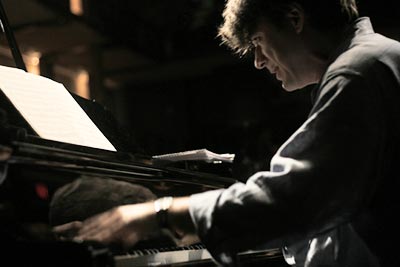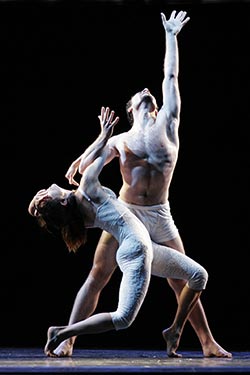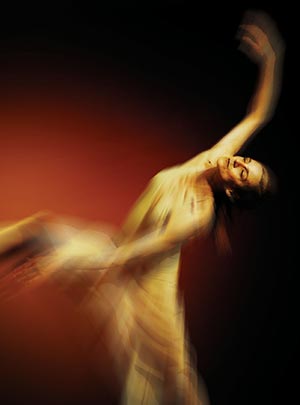 |
Art of Time Ensemble Shakespeare: If music be ...
A music-driven dance and theatrical ode to the Bard |
|
| March 28 & 29, 2008 • Enwave Theatre • Toronto |
|
|
|
|
|
|
shakespeare, Shakespeare, SHAKESPEARE
by David Fujino |
| Over the course of two evening performances, ten artists delivered an imaginative tribute to William Shakespeare's diverse genius at Enwave Theatre.
The tribute was entitled, Shakespeare: If music be ..., a project of Andrew Burashko, the Toronto-based piano soloist and cultural impresario whose mission has been to demonstrate that classical music need not be elitist, stuffy, nor boring.
On the basis of what I experienced on Friday evening, I'd have to say he's succeeded grandly, once again.
Above all, he succeeded because of his acute programming sense — in this case, his good sense to know which artists have interesting things to say about Mr. William Shakespeare, and then put their music, their words, their acting, their dance, right onto the stage.
Here are my impressions of the thirteen separate performances that made up this rich and full and very satisfying Shakespeare/Burashko Programme.
"Words About Shakespeare"
An initial outpouring of words from world famous writers served as prologue to the evening's appreciation of the Bard's supreme creativity and supreme humanity. The writings were read by the evening's four actors, Tom McCamus, Chick Reid, Marc Bendavid, and Cara Ricketts. Tom McCamus read Jorge Luis Borges' dreamy observation that even God, the Grand Writer, had an opinion about Shakespeare, and the cast then read from Herman Melville, Virgina Woolf, Nathaniel Hawthorne, Flaubert, Iris Murdoch, and Cioran, finishing with Marc Bendavid reading a last tribute to Shakespeare, complete with pregnant pause: "I believe he was a genius" ... Mel Gibson."
Of course, this got a laugh from the audience (at the expense of Mr. Gibson who's played Hamlet in film), and it surely made the audience feel superior because, after all, it was worshipping at the feet of the venerable Shakespeare, and not at the feet of the apparently less legitimate goddess, Pellicula.
No matter.
The quotation from Mel Gibson cleared the air and opened the door to an exquisite suite of songs for singer and piano, with text selected from Shakespeare's sonnets and plays.
"Songs from Shakespeare"
(Erich Korngold 1897-1957)
Desdemona's Song / Hey Robin / Come Away, Death / For the Rain, it Raineth Every Day / O Mistress Mine / Blow, Blow Thou Winter Wind / Under the Greenwood Tree / Adieu Good Man Devil
Monica Whicher — Soprano
Andrew Burashko — Piano
|
|
The music of Erich Korngold (the same Korngold who later wrote music for Hollywood films) was changeable and expressive, and it perfectly framed the outstanding talent of soprano Monica Whicher. Besides her supple phrasing and her oh-so-lovely held notes, Whicher proved to be a natural and intuitive actor and her moods matched the ever-changing mood of the songs. Pianist Burashko was the exemplary accompanist; he was there to support. The audience was greatly impressed.
|
|

Andrew Burashko |
|
"More Words About Shakespeare"
from Vladimir Nabokov, Harold Pinter and Boris Pasternak
Tom McCamus, Chick Reid — Actors
More celebrated writers opined about Shakespeare — the man — via the agency of the actors McCamus and Reid. From out of Harold Pinter's string of terse, provocative phrases about Shakespeare I, for one, remember, "he stews in his own juices."
"Romeo and Juliet" Prologue
(William Shakespeare 1574-1616)
Tom McCamus — Actor
When Tom McCamus narrated the timeless story of "Two households, both alike in dignity" (the Montagues and the Capulets); and he spoke about the subsequent death of their children, Romeo Montague and Juliet Capulet (the "star-cross'd lovers" who "take their life"), he was giving more than a performance. He was providing important context for the three superb performances that would follow.
"Romeo & Juliet" March of the Montagues and Capulets
(Sergei Prokofiev 1891-1953)
Andrew Burashko — Piano
Burashko played Sergei Prokofiev's music — its colour, rich dissonance, and hip-trudging rhythms — with all the appropriate pomp and fanfare required to introduce the feuding "Two households" of Verona to an audience.
|
|
"Romeo & Juliet" Act III, Scene V,
Romeo & Juliet before Parting
Marc Bendavid and Cara Ricketts — Actors
Lights up on the actors. We're in Juliet's chamber. Marc Bendavid and Cara Ricketts lay intertwined on a large black box, draped in bedsheets. It's the morning after. The stage is bare. This scene aches with the reluctance of these secret lovers to part. "Wilt thou be gone? it is not yet near day:" (Juliet) "Night's candles are burnt out, ... "I must be gone and live, or stay and die." (Romeo) In this beloved scene, with its beautiful poetry, we feel the torment of forbidden love.
"Romeo & Juliet" Act III, Scene V,
Romeo & Juliet before parting
Andrew Burashko — Piano
Pas de deux, James Kuldeka — Choreography
Piotr Stanczyk and Rebekah Rimsay — Dancers
Lights up on two dancers reclining on a large black box. As they unfold their limbs and step onto the floor, their relationship — that of parting and coming together — is clearly established by Kudelka's exciting choreography. The dancing was charged and magnetic. The breath-taking body geometry fully expressed the tragic love of these two "star-cross'd lovers" ...
|
|

Rebekah Rimsay and Piotr Stanczyk
in Romeo and Juliet Before Parting |
|
|
"And More Words About Shakespeare" from
Voltaire, Henry Miller, Charles Darwin and Lord Byron
Cara Ricketts and Marc Bendavid — Actors
From the quietly impressed Voltaire, to the largely unimpressed Charles Darwin, opinions of Shakespeare vary greatly. We're made to understand that he's either a brilliant man, or he's an ordinary man.
Beatrice and Benedict scenes from
"Much Ado About Nothing"
with Tom McCamus and Chick Reid — Actors
Beneath the casual remarks and verbal jousting of a long time married man and woman, there can exist true love and affection. But seemingly, this love and affection lies deeply buried. Who really knows? Appearances are (ouch) deceiving.
Interspaced with Music by (Erich Korngold 1897-1957)
"Much Ado About Nothing, Op. 11"
The Maiden in the Bridal Chamber / Dogberry and Verges /
Intermezzo — Garden Scene / Masquerade
Andrew Burashko — Piano
Marie Bédard — Violin
In contrast with the earlier "Songs from Shakespeare", these Korngold selections left me somewhat cold. I felt a compositional disconnect between the piano and the lead voice of the violin. Active, loopy, jump-cutting, the violin rhapsodized away on its own. Now, while the piano played harmonic progressions, they seemed to belong to a different piece. The separate parts were fine. They just didn't sound in concert.
Ophelia's Mad Scene, "Hamlet", Act IV, Scene V
Cara Ricketts — Actor
In one of the most famous scenes in Shakespeare's canon — that of Ophelia going mad — Cara Ricketts played it as a firmly outspoken young woman who's a little on the rebellious side, so at one point her 'up yours' gesture — her actor's 'choice' — seemed right. And as her emotions progressed from muted to a slightly declamatory mood — with no paroxysms, and no sudden shifts along the way — we saw a relatively firm-minded young woman exit the stage. Not a personality that had collapsed in on itself.
|
|
Ophelia Lieder (Richard Strauss 1864-1949)
Monica Whicher — Soprano
Andrew Burashko — Piano
Once again, Monica Whicher's musicality was moving and penetrating. And Burashko's percussive piano paralleled Ophelia's shifting mental states. This prepared us for the finale.
Why the Brook Wept set to "Ophelia"
(by John Cage 1912-1992)
Andrew Burashko — Piano
Peggy Baker — Choreography/Dancer
The image.
Peggy Baker's blurred circling arms and long sweeping hair. Upright still postures. Then body and arms full out and extended, Baker circles the space close to the piano — Ophelia's mental and emotional space. John Cage's music the most appropriate. Its hammered thunder and jagged thrills brought paroxysm and breakdown to Baker's world of blur. Then a slow full body collapse to the floor. The piano lid is closed by Burashko, who exits.
The image.
Ophelia fallen on the floor
beside the closed piano.
|
|

Peggy Baker in Why the Brook Wept |
|
|
| Shakespeare: If music be ...
Andrew Burashko – piano
Monica Whicher – soprano
Marie Bérard – violin
Actors
Tom McCamus | Chick Reid | Cara Ricketts | Marc Bendavid
Dancers
Piotr Stanczyk | Rebekah Rimsay
Choreographer / Dancer
Peggy Baker
David Ferry — Director of the Shakespeare performances
André duToit — Stage Manager/Lighting
|
|
|
|
|
|




